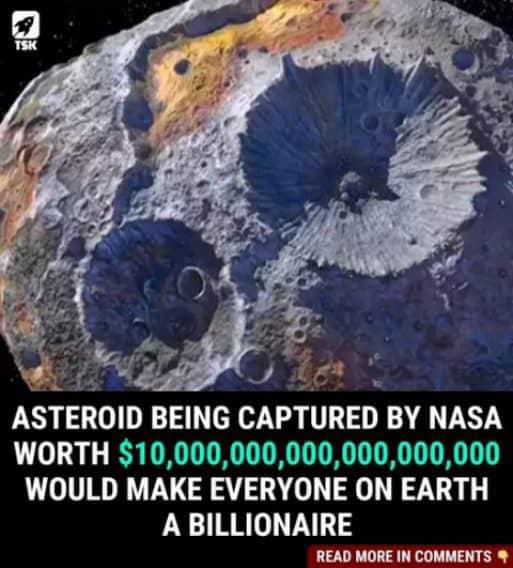NASA Wants to Capture an Asteroid Worth $10 Quintillion Dollars. Thats $10,000,000,000,000,000,000
Months have passed since NASA’s daring proclamation captivated the globe. Since then, it has stirred both enthusiasm and controversy regarding a distant cosmic repository. At the heart of this endeavor lies none other than asteroid 16 Psyche, brimming with untold treasures awaiting discovery.
As per NASA, 16 Psyche boasts a distinctive composition speculated to brim with valuable metals such as gold, iron, and nickel. The projected value of this asteroid is an astounding $10 quintillion. This revelation has sparked intense anticipation and conjecture regarding the implications of such a find.
“NASA’s recent press release revealed that teams of engineers and technicians are dedicating extensive hours to ensure the orbiter is fully prepared for its 2.5 billion-mile journey to a metal-rich asteroid. This mission to 16 Psyche holds the potential to unveil crucial insights into planetary cores and the mechanisms behind planet formation. Describing the preparations as meticulous would be an understatement.”
The journey commenced with a triumphant launch from the Kennedy Space Center in Florida on October 13 of the previous year. This launch heralded the onset of an expedition destined for the farthest corners of our solar system. Since its departure, the spacecraft has been steadily progressing towards the asteroid, maintaining its trajectory flawlessly, ready to unveil its enigmatic secrets.
The Asteroid Itself
Although the astronomical value of 16 Psyche has ignited dreams of boundless riches and abundance, experts have urged against succumbing to economic fantasies. The notion that the mining of this asteroid could instantly turn every person on Earth into a billionaire is fraught with danger and should be approached with caution.
Highlighting the potential economic implications, it was suggested that if NASA were to successfully mine the asteroid and return its riches to Earth, every individual on the planet would essentially become a billionaire. However, the stark reality suggests that such an eventuality would likely lead to an economic collapse, plunging the world into chaos.
NASA has consistently emphasized the primary goal of the mission: scientific exploration. “It’s reassuring that NASA has clarified that mining 16 Psyche is not its intention.” The agency has remained dedicated to advancing our understanding of planetary formation and celestial evolution, prioritizing scientific discovery over any potential financial gains.
Lindy Elkins-Tanton, the principal investigator of the Psyche mission, clarified that the $10 quintillion valuation is more of a conceptual exercise than a realistic appraisal. She further emphasized the immense challenges associated with realizing such an astronomical wealth and noted that the asteroid’s value is incomprehensible in practical terms.
More Than The Money
The voyage to 16 Psyche signifies a groundbreaking milestone in space exploration, pushing the boundaries of human ingenuity and technological prowess. Nicola Fox, the associate administrator for NASA’s science mission directorate, explained, “Psyche 16 is notably the largest, which is precisely why it captivates our interest. Smaller asteroids are more susceptible to alterations from impacts, whereas the vastness of this one leads us to believe it remains largely unchanged.”
Upon reaching 16 Psyche, NASA intends to undertake a thorough and exhaustive examination utilizing advanced instruments such as a multispectral imager, a gamma-ray and neutron spectrometer, and a radio instrument. The objective is to decipher the asteroid’s composition, shed light on its geological past, and unveil its cosmic significance.
NASA’s expedition to 16 Psyche surpasses mere material wealth (though it certainly boasts an immense value) and provides a window into the intricacies of our universe. Beyond its potential riches, the asteroid serves as a catalyst for scientific exploration and advancement, poised to deepen our comprehension of planetary formation and the cosmos we call home.






